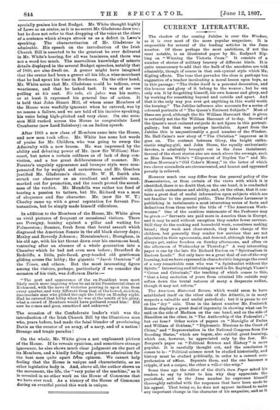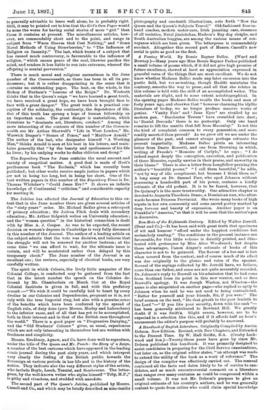CURRENT LITERATURE.
The shadow of the coming Jubilee is over the Windsor, as it is over most of the more popular magazines. It is responsible for several of the leading articles in the June. number. Of these perhaps the most ambitious, if not the. most notable, is an illustrated paper by Mr. Rudyard Kip.. ling on "Winning the Victoria Cross." It consists of a. number of stories of military bravery of different kinds. It is quite unnecessary to add that the bulk of the anecdotes are told admirably, though of course in that sub-cynical style which Mr. Kipling affects. The tone that pervades the close is perhaps to suggestive of a teacher inculcating a moral lesson upon boys, as in this passage : "The Order itself is a personal decoration, and the honour and glory of it belong to the wearer ; but he can only win it by forgetting himself, his own honour and glory, and by working for something beyond and outside and apart. And that is the only way you ever get anything in this world worth the keeping." The Jubilee influence also accounts for a series of coloured portraits of" The Queen's Eminent Subjects." Most of these are good, although the Sir William Harcourt that is given is certainly not the Sir William Harcourt of to-day. Several of the Queen's most eminent subjects do not figure in this portrait- gallery; but that was perhaps inevitable. Apart from the Jubilee this is unquestionably a good number of the Windsor. Mr. Hall Caine's new story of "The Christian" improves as it goes on. The contrast between Glory, the bright enthu- siastic singing-girl, and John Storm, the equally enthusiastic devotee, is admirably brought out in the June instalment. Several of the short stories also are much above the average, such as Miss Roma White's "Elopement of Dryden Tar" and Mr. Arthur Morrison's "Old Cater's Money," in the latter of which two clever scoundrels are circumvented, and honest and oppressed poverty is relieved.
However much one may differ from the general policy of the Humanitarian, or from certain of the views with which it is- identified, there is no doubt that, on the one hand, it is conducted with much earnestness and ability, and, on the other, that it con- tains a great deal of useful information upon subjects which are not familiar to the general public. Thus Professor Levasseur is publishing in instalments a most interesting series of facts and deduct ions from them under the title of "The American Work- woman." One of the cautions statements of the Professor may be given :—" Servants are paid more in America than in Europe,. and it may be said without exception they render fewer services. Still they do the cooking and household work, sometimes making bread ; they wash and clear-starch, they take charge of the children, but generally they render few services that are not stipulated in their agreements, and demand, although they do not always get, entire freedom on Sunday afternoons, and often on the afternoon of Wednesday or Thursday." A very interesting paper is one by the late Sir Richard Burton on "Spiritualism in Eastern Lands." Not only have we a great deal of out-of-the-way learning, but we have expressed in characteristic language the creed of a very remarkable man who was "a Spiritualist without the Spirits." Interesting and informing as well is Dr. Rayleigh Vicars's "Crime and Criminals," the teaching of which comes to this,. "that a long seclusion of years from criminal life outside may soften down the brutal natures of many a desperate ruffian, though it may not reform."
The American Historical Review, which would seem to have established itself on the other side of the Atlantic, is in many respects a valuable and useful periodical ; but it is prone to err on the " dry " side. Thus in the latest number Mr. Frederick Bourne displays a great deal of ingenuity in showing what can be said on the side of Madison on the one hand, and on the side cf Hamilton on the other, in "The Authorship of the Federalist ;" but cui bone? Other series of papers on " Marsiglio of Padua and William of Ockham," "Diplomatic Missions to the Court of China," and "Representation in the National Congress from the Seceding States," which are begun, also exhibit great learning, which can, however, be appreciated only by the few. Mr. Burgess's paper on "Political Science and History" is more popular. It is carefully thought out, and the conclusion it comes to is : "Political science must be studied historically, and history must be studied politically, in order to a correct com- prehension of either. Separate them, and the one becomes a cripple, if not a corpse, the other a will-o'-the-wisp."
Some time ago the editor of the Girl's Own Paper asked his readers to say by letter to him why they appreciate the periodical, and in the June number he expresses himself thoroughly satisfied with the responses that have been made to his appeaL That being so, he does not appear inclined to maka any important change in the character of his magazine, and as it is generally advisable to leave well alone, he is probably right. Still, it may be pointed out to him that the Girl's Own Paper would be none the worse for having serial stories of more " grit " than those it contains at present. The miscellaneous articles, how- ever, are commendably short and to the point, and range in subject from "Warm Sleeves that Cost Nothing," and "Some Novel Methods of Using Strawberries," to "The Influence of Religion on Insanity." The last, which treats of a subject that has caused much controversy, is favourable to the influence of religion, "which causes peace of the soul, likewise pacifies the mind, and renders it less liable to run into extremes, whereof the offspring is mental perversion."
There is much moral and religious earnestness in the June number of the Commonwealth, as there has been in all its pre- decessors; but it is rather disappointing in the sense that it contains no outstanding paper. The best, on the whole, is the Bishop of Durham's "Lessons of the Reign." Dr. Westcott thinks that in the Queen's reign "we have learned a great truth, we have received a great hope, we have been brought face to face with a great danger." The great truth is a practical con- ception of the solidarity, the continuity, the dependence of life. Out of this truth has sprung a hope of human fellowship on an important scale. The great danger is materialism, which threatens to "dominate art, literature, conduct." Among the more interesting of the contents of this number of the Common- wealth are Mr. Arthur Sherwell's "Life in West London," Mr. Warwick Draper's "Stones of Peace," and "Matthew Arnold." The author of the last, who designates himself "A Working Man," thinks Arnold is seen at his best in his letters, and main- tains generally that "by the beauty and spotlessness of his life he lives ; by his undying works he defies oblivion and decay."
The Expository Times for June contains the usual amount and variety of exegetical matter. A good deal is made of Hort's posthumous book "The Ecclesia," which has recently been published; but other works receive ample justice in papers which err not in being too long, but in being too short. One of the best written papers in this number of the Expository Times is Dr. Thomas Whitelaw's "Could Jesus Err F" It shows an infinite knowledge of Continental "criticism" and considerable capacity for meeting it.
The Jubilee has affected the Journal of Education to this ex- tent that in the June number there are given several articles of the "sixty years" order. Mr. Michael Sadler gives a retrospect of primary education ; Sir Joshua Fitch deals with secondary education ; Mr. Arthur Sidgwick writes on University education ; and the "woman question" in the historical connection is dealt with by Miss A. J. Cooper. As was to be expected, the recent decision on women's degrees in Cambridge is very fully discussed in this number of the Journal. The author of a leading article on the subject admits that the vote was decisive, and believes that the struggle will not be renewed for another lustrum ; at the same time "we can afford to wait, for the ultimate issue is certain, and will be accelerated rather than delayed by this temporary check." The June number of the Journal is an excellent one; the reviews, especially of classical books, are very carefully written.
The spirit in which Co/onia, the lively little magazine of the Colonial College, is conducted may be gathered from the fact that in the latest number the speech on the Colonies de- livered by Mr. Chamberlain on March 31st at the Royal Colonial Institute is given in full, and with this prefatory remark :—" We wish it could be carefully laid to heart by every dweller in our Colonies and Dependencies, pregnant as it is, not only with the true Imperial ring, but also with a genuine sense of the benefits which have been conferred by the spread of English rule, of duty done (pace Messrs. Morley and Labouchere) to the inferior races, and of all that has yet to be accomplished, both in their interest and in that of the British race throughout the world." There is a good paper on "Progressive Dairying," and the "Old Students' Column" gives, as usual, experiences which are not only interesting in themselves but are written with freshness and simplicity.
Messrs. Bradbury, Agnew, and Co. have done well to reproduce, under the title of The Queen and Mr. Punch : the Story of a Reign, a number of the best cartoons which have appeared in the leading comic journal during the past sixty years, and which interpret very clearly the feeling of the British public towards the Sovereign at various periods in her life and in the history of the nation. They indicate also the very different styles of the artists, who include Doyle, Leech, Tennis], and Sambourne. The letter- press, by the well-known writer who styles himself "Toby, M.P.," U pithy and vivacious, and studded with anecdote.
The second part of l'hs Queen's Jubilee, published by Messrs. Cassell and Co., and which may be briefly described as nine-tenths
photography and one-tenth illustrations, sets forth "How the Queen and the Queen's Subjects TraveL" Old-fashioned four-in- hand coaches, modern motor-cars, Irish jaunting cars, steamers of all varieties, Natal jiurickshas, Hudson's Bay dog sleighs, and South Australian buggies, are among the various means of con- veyance which are here given. The letterpress is commendably succinct Altogether this second part of Messrs. Cassell's new serial is quite as good as the first.



































 Previous page
Previous page